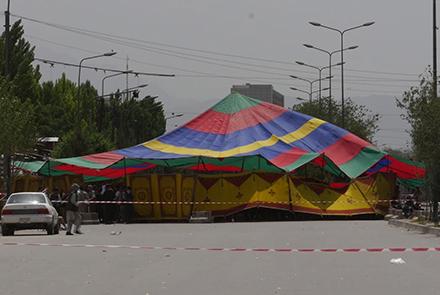Recent deadly incidents in the country, particularly the ‘massive’ truck bombing in Kabul, have created rift among a number of major political parties in the country besides the huge financial and human losses which the attack inflicted to the people.
Sessions held by Jaimat-e-Islami party to discuss the current situation and remarks made by the Hizb-e-Islami leader Gulbuddin Hekmatyar at a press conference last week, are the main instances of differences of views among political parties towards the recent incidents in the country.
The truck bomb explosion in Kabul was followed by a demonstration in the city where a number of protestors were killed and wounded after the rally turned violent.
The protest was followed by sit-in camps established by protestors in various parts of the city.
Key members of the Jamiat-e-Islami party’s leadership including Balkh governor Atta Mohammad Noor, acting foreign affairs minister Salahuddin Rabbani and Mohammad Ismail Khan supported the demands of protestors and slammed government for lack of reforms in security institutions.
Meanwhile, a number of political parties and figures including Hekmatyar, Sayed Mansur Naderi, head of the National Solidarity Party, a number of MPs and the Rights and Justice Party of Afghanistan supported President Ashraf Ghani’s stance towards the protestors’ demands.
In addition to this, a number of figures and governors also held meetings in support of government.
“In such a critical time, the only way that can help Afghans to overcome the situation is wisdom, a political wisdom, as well as looking wisely to the situation and dealing wisely with the current political issues,” said Hadi Miran, an international relations analyst.
A number of political figures that often have been involved in such political tensions, have not taken any side so far.
CEO Abdullah Abdullah, First Vice President Abdul Rashid Dostum, Second Vice President Mohammad Sarwar Danish, the head of the High Peace Council Mohammad Karim Khalili, and the second deputy of the CEO Mohammad Mohaqiq have not taken any stance about the ongoing situation.
“The current tension can have harmful repercussions for Afghanistan. I don't think government will remain by the time that has been specified in the Constitution if the situation prevails,” said Abdulhai Akhundzada, an MP.


